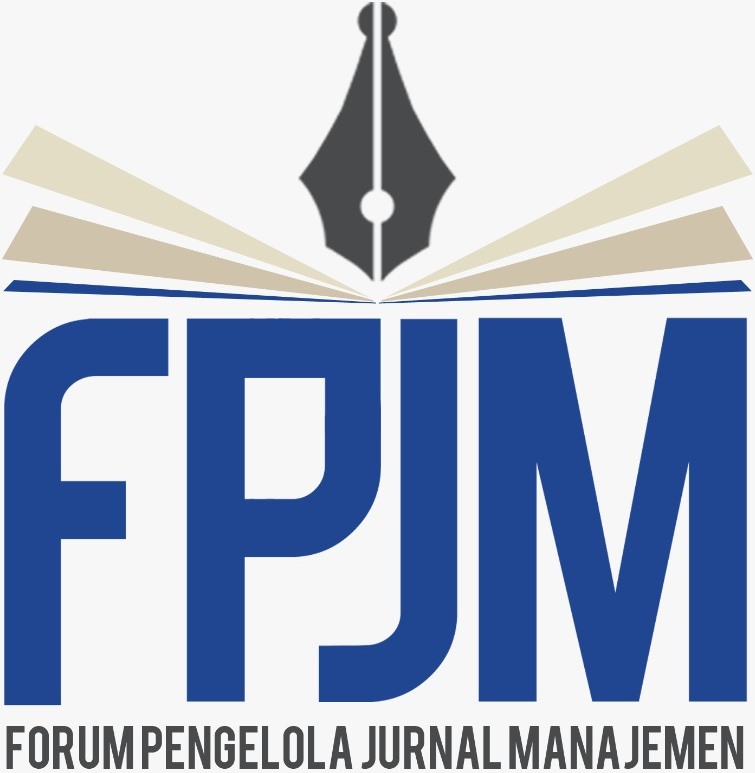INTERACTION BETWEEN FINANCIAL SECTOR DEVELOPMENT AND MICROFINANCE INSTITUTION (MFIs) PERFORMANCE IN SOUTHEAST ASIA
Abstract
Abstract: This study aims to examine the effect of financial sector development on the financial and social performance of MFIs. This research is a quantitative research. The population is all MFIs listed on MixMarket. This study uses purposive sampling with MFI criteria that have complete data needed from 1999 to 2019. This study uses panel data because it uses MFIs from nine countries but in different years. Data collected using data from MixMarket with a research period between 1999 and 2019. The results show that the revival of the financial sector has a negative impact on the independence of MFIs. On the other hand, progress in the financial sector also has a negative impact on MFIs for the poor. This condition indicates that there is competition between the two, as developments in the financial sector have a negative impact on the MFI's ability to generate higher incomes. The implication of this finding is that policy makers are more careful in determining the operational reach of the traditional financial sector and MFIs.
Abstrak: Penelitian ini bertujuan untuk menguji pengaruh pengembangan sektor keuangan terhadap kinerja keuangan dan sosial LKM. Penelitian ini adalah penelitian kuantitatif. Populasinya adalah semua LKM yang terdaftar di MixMarket. Penelitian ini menggunakan purposive sampling dengan kriteria LKM yang memiliki kelengkapan data yang dibutuhkan dari tahun 1999 hingga 2019. Penelitian ini menggunakan data panel yang karena menggunakan LKM dari sembilan negara tetapi berbeda tahun. Data penelitian dikumpulkan dengan menggunakan data dari MixMarket dengan periode penelitian antara 1999 hingga 2019. Hasil penelitian menunjukkan bahwa kebangkitan sektor keuangan berdampak negatif terhadap independensi LKM. Di sisi lain, kemajuan sektor keuangan juga berdampak negatif pada jangkauan LKM kepada masyarakat miskin. Kondisi ini menunjukkan adanya persaingan di antara keduanya, karena perkembangan sektor keuangan berdampak negatif pada kemampuan LKM untuk menghasilkan pendapatan yang lebih tinggi. Implikasi dari temuan ini adalah pembuat kebijakan lebih berhati-hati dalam menentukan jangkauan operasional sektor keuangan tradisional dan LKM.
Keywords
References
Ahlin, C., Lin, J., & Maio, M. (2011). Where does microfinance flourish? Microfinance institution performance in macroeconomic context. Journal of Development Economics, 95(2), 105120. https://doi.org/10.1016/j.jdeveco.2010.04.004
Churchill, S. A. (2019). The macroeconomy and microfinance outreach: a panel data analysis. Applied Economics, 51(21), 22662274. https://doi.org/10.1080/00036846.2018.1540857
Cull, R., Demirgüç-Kunt, A., & Morduch, J. (2009). Microfinance meets the market. Journal of Economic Perspectives, 23(1), 167192. https://doi.org/10.1257/jep.23.1.167
Deb, J. (2018). Competition and Commercialisation of Microfinance Institutions: Implications for the Sector. International Journal of Business Ethics and Developing Economies, 7(2), 2736.
Evans, E., Opoku, O., Ibrahim, M., Sare, Y. A. (2019). The causal relationship between financial development and economic growth in Africa. International Review of Applied Economics, 33(6), 789812. https://doi.org/10.1080/02692171.2019.1607264
Gonzalez, A. (2011). Resilience of Microfinance Institutions to National Macroeconomic Events: An Econometric Analysis of MFI Asset Quality. SSRN Electronic Journal, (Mix). https://doi.org/10.2139/ssrn.1004568
Hamada, M. (2010). Commercialization of microfinance in indonesia: The shortage of funds and the linkage program. Developing Economies, 48(1), 156176. https://doi.org/10.1111/j.1746-1049.2010.00102.x
Hermes, N., & Hudon, M. (2018). Determinants of The Performance of Microfinance Institutions: A Systematic Review. Journal of Economic Surveys, 32(5), 14831513. https://doi.org/10.1111/joes.12290
Hermes, N., Lensink, R., & Meesters, A. (2009). Financial Development and the Efficiency of Microfinance Institutions. Groeningen.
Hermes, N., Lensink, R., & Meesters, A. (2011). Outreach and Efficiency of Microfinance Institutions. World Development, 39(6), 938948. https://doi.org/10.1016/j.worlddev.2009.10.018
Iqbal, S., Nawaz, A., & Ehsan, S. (2019). Financial performance and corporate governance in microfinance: Evidence from Asia. Journal of Asian Economics, 60, 113. https://doi.org/10.1016/j.asieco.2018.10.002
McIntosh, C., Dejanvry, A., & Sadoulet, E. (2005). How Rising Competition among Microfinance Institutions Affects Incumbent Lenders. The Economic Journal, 115(506), 9871004.
Mersland, R., & Øystein Strøm, R. (2009). Performance and governance in microfinance institutions. Journal of Banking and Finance, 33(4), 662669. https://doi.org/10.1016/j.jbankfin.2008.11.009
Rahman, A., Khan, M. A., & Charfeddine, L. (2020). Financial developmenteconomic growth nexus in Pakistan: new evidence from the Markov switching model. Cogent Economics and Finance, 8(1). https://doi.org/10.1080/23322039.2020.1716446
Reed, L. R. (2015). Mapping Pathways out of Poverty. Microedit Summit Campaign.
Reichert, P. (2018). A meta-analysis examining the nature of trade-offs in microfinance. Oxford Development Studies, 46(3), 430452. https://doi.org/10.1080/13600818.2018.1427223
Vanroose, A., & DEspallier, B. (2013). Do microfinance institutions accomplish their mission? Evidence from the relationship between traditional financial sector development and microfinance institutions outreach and performance. Applied Economics, 45(15), 19651982. https://doi.org/10.1080/00036846.2011.641932
Vogelgesang, U. (2003). Microfinance in times of crisis: The effects of competition, rising indebtedness, and economic crisis on repayment behavior. World Development, 31(12), 20852114. https://doi.org/10.1016/j.worlddev.2003.09.004
Xu, S., Copestake, J., & Peng, X. (2016). Microfinance Institutions Mission Drift in Macroeconomic Context. Journal of International Development, 28(1), 11231137. https://doi.org/10.1002/jid
DOI: 10.34203/jimfe.v7i1.3069
Refbacks
- There are currently no refbacks.
Copyright (c) 2021 JIMFE (Jurnal Ilmiah Manajemen Fakultas Ekonomi)

This work is licensed under a Creative Commons Attribution-NonCommercial-ShareAlike 4.0 International License.











